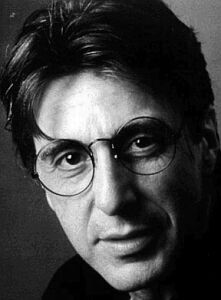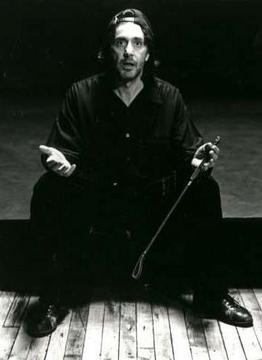| More Pacino Worldwide! |
| The Yale University Article |
|
 |
  ~~"Actors must connect with
their characters," says Pacino **December 6-13, 1999 Volume 28, Number 15 ~Striding down the center aisle of the University Theatre, Academy Award-winning actor Al Pacino flung his arms open wide and proclaimed with a grin, "I don't know what I'm walking into here!" The declaration drew both laughter and applause from the assembled undergraduates, who certainly knew why they were there -- to garner insights about acting, specifically acting in Shakespearean plays, from one of today's most acclaimed thespians. Pacino came to campus as a guest of the Yale University Dramatic Association, the Yale Film Society and the Yale Shakespeare Company. His Nov. 19 visit included a master class on acting in the School of Drama's University Theatre; screenings at the Whitney Humanities Center of Pacino's latest film, "The Insider," and of "Looking for Richard," a documentary about the creation of a production of Shakespeare's "Richard III," which Pacino starred in, directed and produced; a question-and-answer session with the celebrity after the screenings (see related story, below); and a dinner in Pacino's honor, where he was given an award in recognition of his achievements in acting by Yale College Dean Richard Brodhead.
The hundred or so undergraduates who had gathered at the drama school to hear Pacino's advice on acting included members of the Yale Dramat and theater studies majors. The session began with two scenes from "Othello" -- the murder of Desdemona and an argument between the Moor and Iago -- performed by undergraduate actors.
At the conclusion of these scenes, Pacino pulled a chair onto the stage and questioned the performers about how they'd chosen the scenes they'd staged (the selections had been assigned), how long they'd rehearsed their roles (about four days) and who had directed the performances (only themselves). He encouraged the students to continue working on the scenes -- perhaps even to videotape their performances -- until they'd developed a deep understanding of their character's motivations. Pacino then proceeded to offer suggestions to the group in general about how to enhance their performance skills.  The most important thing for an actor, explained Pacino, is to find a way to develop a bond with his or her character. "The role that connects -- it's the greatest thing that can happen to every actor," he said. In years gone by, Pacino noted, actors would often find one role that they were particularly good in, and perform that role exclusively. "In our world today, it's not the same thing. Today it's all about diversity," he said. Pacino noted that, during his days doing repertory theater, he would sometimes audition for a specific role that both he and others thought would be perfect for him, only to end up with another part. Yet, he said, grappling with those less-coveted roles helped him grow as an actor, and he encouraged the students to attempt characters that might, at first, seem incomprehensible to them. "We don't know what's right for us until we try it," he said.  Turning to the challenges of performing in Shakespeare's plays, Pacino contended that the Bard's works are perfect for actors because they were written by someone who was a performer himself. "Only an actor can understand actors. ... So, who can understand Shakespeare better than actors?" he said, advising that performers "stay closest to what Shakespeare wrote" in interpreting their roles. Pacino conceded that the antiquated language in Shakespeare's plays can impede actors' abilities to understand their characters, and suggested that the young thespians begin by reading the play over and over until they comprehend the meaning behind the language. He also encouraged them to sing their lines, as if they were performing in an opera. "The notes can bring us to a certain place. ... Then all of a sudden, it starts to happen," he said. The actor -- who has won Tony, Obie and Theatre World awards for his roles in Broadway and off-Broadway productions -- also told the students, "Sometimes it's a good idea to improvise. I know that sounds crazy when you're talking about Shakespeare. But once you improvise being in a certain situation, when you go back into character, you have a better idea of what your motivations are in the scene." Asking questions about the character can also offer insights into their motivations, said the celebrity. "Has Othello ever been in love before? ... Why is Iago so [expletive] mad?" Pacino noted, "You have to find a way to make this role and this situation connect to you, so you can be engaged with it. ... If you can make that connection, it will take away the tendency to fall into the 'language thing,' or to be stifled by it or inhibited by it. ... An adventure is going to start when you know who you are in relation to the character. The star, who won an Oscar for his role in "Scent of a Woman," pointed out to the students that, "We're required as actors to be in a certain state in order to render, mirror, what's going on in this play." By taking the time to learn every aspect of the character, actors become "really privy to so much stuff ... that makes us have so much more information than anyone in the audience will have, but we have to swallow it, so they can understand." -- By LuAnn Bishop
|
||||||||||
|
 |